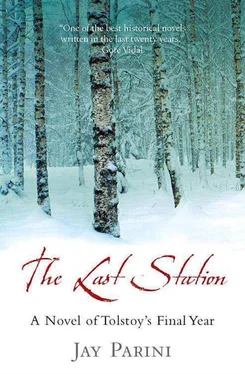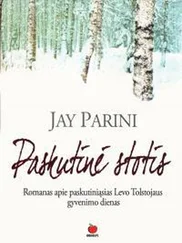‘You aren’t crying because of this red tree,’ he said. ‘You are crying for Sonya.’
I protested. Wasn’t it my name day? Wasn’t I the luckiest woman in all of Russia, to have married the most promising writer of his generation, to have three small, beautiful children and a large house in the country?
But he was right, of course. I wept for Sonya.
That night the servants prepared an elegant early dinner on the terrace, setting a table in the late-afternoon sun. My sister Tanya had brought a lovely pheasant pâté from Moscow, which she served on a cool cipolin platter – a gift from Mama. There was black bread fresh from the oven. There were large wet grapes in white bowls, with oranges from the south in red bowls. And borscht and, later, duck in a Parisian glacé. There was lamb, too, and a bit of goose. Sweet cakes of bran and honey tumbled from a basket. Lyovochka poured the wine, much more of it than anyone should have drunk!
A number of young officers from the Tula regiment appeared, in smart dress uniforms with silver buttons. Lyovochka did not hate the military then. His years in the army were not so far behind him then, or his memory of the Caucasus. He would lie beside me in bed, telling me about Prince Gorchakov and the siege of Silistra. I treasured those nights, those stories. And I miss them, as I miss the young officers who ate, so often, at our table.
We gathered about the long table with its crisp linen tablecloths and English china. The crystal caught the sunlight and sparkled with a brightness that was almost painful. ‘Today is the Feast of the Martyrs,’ Lyovochka told the assembled company, proposing the toast. ‘The Blessed Martyrs,’ he said, correcting himself, as one or two of the officers chuckled. ‘There is Vera, whose name is Faith. And Nadezhda, who is Hope, and Lyubov, which means Charity. Their mother is Sofya, meaning Wisdom. To thee, my Sofya, source of all wisdom, love of my life….’ Glasses clinked. I bowed my head, determined not to weep.
From the garden, well hidden by trees and bushes, came the gay strains of my favorite opera, La Muette de Portici . Lyovochka rushed to my side, drawing me into his arms for a brief public display of strong affection. I could feel the pressure of their eyes upon us as we kissed. But I did not mind. ‘Just one dance – before dinner?’ Lyovochka asked me. I dipped my eyes, shyly, to the floor, but I danced beautifully in those days, before my knees were stiffened by too many damp mornings in the country.
Over his shoulder, I saw that Marya Ivanovna was looking into her empty plate. This occasion, I think, ended her little obsession with my husband. It was a lance thrown into her chest by Lyovochka himself!
After dinner, the real dancing began. Only the aged aunts and their wizened friends refused to join us whirling on the stone terrace, spinning in celebration of the Martyrs.
Lyovochka insisted, as always, on the kamarinskaya , a dance with intricate, quick steps. A few tried to sit it out, but he would have none of it. Lyovochka was the ringmaster, driving us – especially the younger officers – into ever more wild and lavish gestures.
Long before the others left, I was led by Lyovochka to the bedroom. Our abrupt departure was almost embarrassing, but I didn’t mind. One of the young officers caught my eye as we left; I knew what he was thinking, and it terrified me slightly.
Before I could even undress, Lyovochka was kissing me frantically on the neck and shoulders. I lay back on the broad bed and let him do what he had to do. It was not unenjoyable then, as it would become. Soon his trousers were down about his knees. I closed my eyes when his large red hands reached under my dress, the flat palms pressing hard on my nipples. And I let him take me, as he would, quickly. I wished he understood about these things, but I could not tell him. I let him fall asleep, half dressed, nuzzling into my shoulder.
When the dawn broke over Zasyeka Wood, he was gone. He had taken himself, as usual, to his study. I found him there later, his lips pursed, the candle still burning in the daylight. His quill dug deep letters in the page; his eyes flickered with a wild energy that I loved. He did not notice me, even when I put my hands on his shoulders and breathed, softly, on the back of his broad, white neck.
‘But sex?’ asked Chertkov, rubbing his forehead with the palm of a hand disfigured by eczema. ‘You are only twenty-four.’ He leaned forward across the desk. ‘Not an easy age for abstinence.’
I withdrew the smile that had formed on my lips against my will. Vladimir Grigorevich Chertkov has no sense of humor. Apart from his plumpness and bad skin, this humorlessness is the most noticeable thing about him.
‘I know that Count Tolstoy does not approve of sexual relations.’
‘He despises them,’ Chertkov replied. ‘And, if I may advise you, he does not use his title. He renounced it years ago.’
Chertkov unnerved me. I felt uncomfortable not using Tolstoy’s title. I had been brought up in polite company, taught to defer to those with power. It annoyed me that Chertkov imagined I wouldn’t know about the renunciation of that title. I know practically everything about Tolstoy that can be learned from his writings, and much else besides. There is a thick smoke of gossip surrounding the name of Leo Tolstoy, and I had inhaled that smoke on every possible occasion.
‘You must call him Leo Nikolayevich, like the rest of us,’ Chertkov added. ‘He prefers that.’
Chertkov’s chameleonlike skin puffed loosely about his bald, pear-shaped head. I could almost see through his forehead to the frontal lobes of his brain. He spoke stiffly, tapping his puffy fingers on the bare table. ‘I take it you have read The Kreutzer Sonata ?’
I nodded, though I hoped we would not discuss this particular work. The Kreutzer Sonata is Tolstoy’s one failure, as I see it. Is there anything in common between Pozdnyshev, the hero of that tale, and Leo Tolstoy? I cannot believe it. It’s the story of a man who murders his wife. Many readers – I don’t go this far myself – consider it a tract against marriage, a missile of hate, a vile book. It is so unlike Anna Karenina , where Tolstoy celebrates the marriage of Kitty and Levin, raises it like a banner across the cold Russian sky. But Pozdnyshev!
‘I don’t want to belabor the point of chastity, but I arranged for a servant last year who proceeded to ruin two young housemaids who had been with the Tolstoy family for many years. It upset Leo Nikolayevich terribly. I want to make it clear that this won’t be a problem.’
I shook my head in outward assurance but inwardly was horrified that I should be classified with a servant. I think my anger showed in my cheeks. I tried to cover them with my hands.
‘I’m sorry to bring up a delicate subject,’ Chertkov said. ‘One can never be too specific, I always say.’
‘It’s all right,’ I said. ‘I understand.’
The job seemed to slip away from me, and I panicked. More than anything, I wanted to be Tolstoy’s private secretary.
Chertkov circled the desk and stood beside me. He put a cold hand on my wrist. ‘I have heard only good things about you from Makovitsky and the others. And I have read carefully what you have written about Leo Nikolayevich. So has he. It is somewhat… youthful. But quite sound.’
‘Tolstoy has read my essays?’
Chertkov shook his head in confirmation. I beamed. It appeared that everything would fall, amazingly, into place.
‘I don’t want to prejudice you against Sofya Andreyevna, but it would be impolitic of me not to mention her disagreements with Leo Nikolayevich,’ Chertkov went on. ‘It has been an unfortunate marriage – for him.’ He began to pull his silky black beard, drawing it to a point beneath his chin. The beard gives him the look of a Tartar. ‘Frankly,’ he continued, ‘she is not one of us. I would go so far as to say that she despises us and would do anything in her power to see that her husband’s work does not go forward.’
Читать дальше












